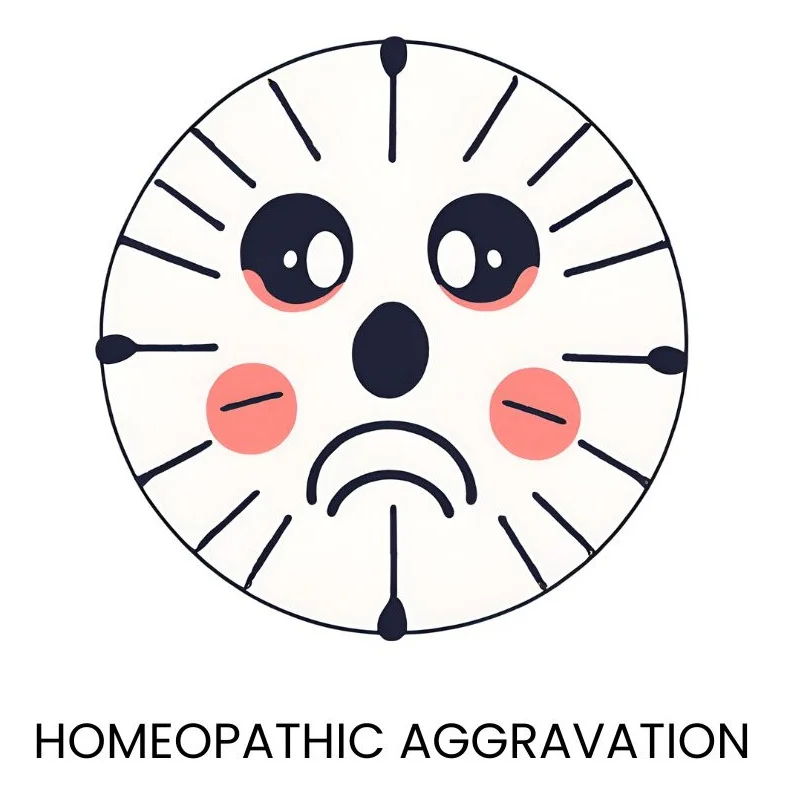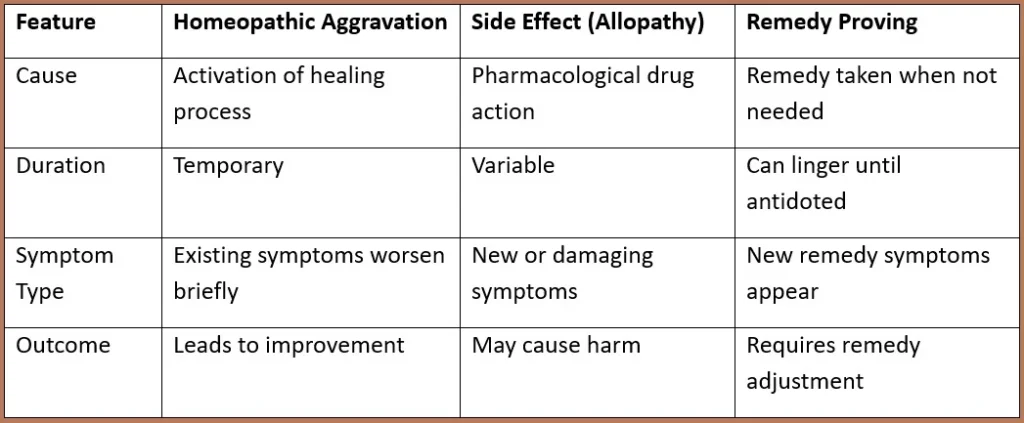Have you ever taken a homeopathic remedy only to feel worse before you feel better? This might seem alarming at first — but in many cases, it’s actually a sign of healing.
This phenomenon is known as homeopathic aggravation, and while it can be unsettling, it’s often a natural part of the healing process.
In this blog post, we will break down what homeopathic aggravation really is, why it happens, how long it lasts, and what you should do when it occurs.
Whether you are a patient exploring holistic options or a homeopath guiding clients, understanding this concept can help navigate treatment with clarity and confidence.

Table of Contents
ToggleWhat Is Homeopathic Aggravation?
Homeopathic aggravation refers to a temporary intensification of existing symptoms after taking a homeopathic remedy.
This usually happens within hours or days of starting the medicine and is seen as a positive sign that the body is responding.
It’s not a side effect in the conventional sense — rather, it’s a signal that the remedy has matched the energy of your illness and stimulated a healing response.
Why Does Homeopathic Aggravation Happen?
Homeopathy works by stimulating the body’s vital force — the inner energy responsible for maintaining health and balance.
When a remedy matches the person’s overall picture (known as the similimum), it can temporarily stir up symptoms as the system begins to correct itself.
Possible Causes of Aggravation
- Correct Remedy, Right Response
- The remedy is well-chosen and activates the body’s healing mechanisms.
- The symptoms intensify briefly, then begin to resolve.
- High Sensitivity
- Highly sensitive individuals (mentally or physically) may react more noticeably, even to very low doses.
- High Potency
- Higher potencies (like 200C, 1M) may trigger a stronger aggravation than low potencies like 6X or 30C.
- Suppressed Symptoms
- If the person has used conventional treatments that suppressed symptoms, the remedy may unearth the underlying disease pattern.
How to Identify a Homeopathic Aggravation
Not every worsening of symptoms is an aggravation.
It’s important to differentiate between a healing response and a true side effect or proving.
Signs of True Homeopathic Aggravation
- The same symptoms become slightly worse.
- The aggravation is short-lived, usually lasting a few hours to a few days.
- After the aggravation, overall improvement follows.
Not an Aggravation If
- New, unrelated symptoms appear — this could be a proving (where you begin to display new symptoms of the remedy).
- The symptoms persist without improvement.
- You feel generally worse with no periods of relief.
Examples of Homeopathic Aggravation
Case 1: Migraine Relief
A woman suffering from long-term migraines takes Natrum Muriaticum 200C.
Within hours, her headache worsens, and she becomes weepy and withdrawn.
But by the next day, the pain reduces significantly, and her energy improves.
This is a classic example of homeopathic aggravation.
Case 2: Skin Conditions
A man with eczema starts Sulphur 30C.
His itching flares up, and old rashes reappear.
This is often seen when the body starts pushing disease outwards — a sign that deep healing is underway.
The Role of Hering’s Law of Cure
Homeopathic aggravation aligns with Hering’s Law of Cure, which states:
“Healing progresses from within outwards, from more important to less important organs, and in the reverse order of symptom appearance.”
In aggravation, old or suppressed symptoms may come back briefly before being cleared. This is seen as the body retracing its steps back to balance.
How to Handle Aggravation
For Patients
- Stay Calm: Don’t panic if symptoms worsen temporarily.
- Observe Closely: Track changes in intensity, duration, and character of symptoms.
- Communicate: Report aggravations to your homeopath.
- Don’t Repeat the Dose Immediately: Wait for the aggravation to subside before repeating.
For Practitioners
- Anticipate Aggravation: Warn sensitive patients in advance.
- Modify Potency: Use LM potencies or low X potencies for hypersensitive patients.
- Adjust Dosage: Consider water dosing or olfaction (smelling) to soften aggravation.
When Aggravation Is Not Desirable
While aggravation can signal healing, it’s not always welcome — especially in frail or highly sensitive patients.
An aggravation that’s too intense or prolonged may indicate:
- Remedy given in too high potency
- Repetition of doses too frequently
- Wrong remedy altogether
In such cases, the homeopath may need to antidote the remedy (neutralize its effects) or simply wait and allow the system to stabilize.
Does Everyone Experience Aggravation?
No. Not everyone will experience a noticeable aggravation.
Many people report smooth, gentle healing without any worsening at all.
This doesn’t mean the remedy isn’t working — just that your system responded calmly and efficiently.
Factors that influence whether aggravation occurs:
- Sensitivity of the patient
- Type of illness
- Potency and frequency
- Overall health and vitality
Aggravation vs Side Effect vs Proving

Final Thoughts: Trust the Process
Homeopathic aggravation can feel uncomfortable, but it’s often a positive part of the healing journey.
By understanding it better, both patients and practitioners can work with the body rather than fearing its natural responses.
Remember, the goal of homeopathy is gentle, lasting healing — not suppression. Aggravation, when managed wisely, is just a brief cloud on the path to clearer skies.
